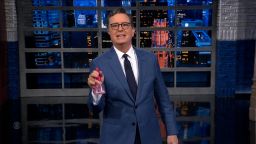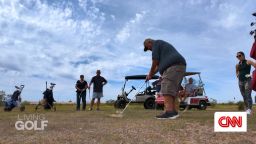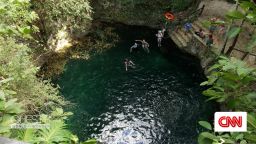If you’re willing to spend $250,000 for a quick trip to space, that option is getting closer to reality.
VSS Unity, Virgin Galactic’s rocket-powered plane, climbed to a record altitude of nearly 56 miles during a test flight on Friday, marking the second time Richard Branson’s startup has reached space. Two pilots, and for the first time, an additional crew member, were on board.
Beth Moses, Galactic’s chief astronaut trainer and an aerospace engineer, rode along with the pilots. The trip allowed her to run safety checks and get a first look at what Galactic’s customers could one day experience.
Moses has logged hundreds of hours on zero gravity aircrafts, and she described the G Forces aboard the supersonic plane as “mildly wild.” Some moments were intense, she told CNN Business, but it was never uncomfortable.
“I was riveted and I think our customers will be as well.”
Unity took off from a runway in California’s Mojave Desert just after 8 am PT and cruised to about 45,000 feet attached to its mothership before it broke away and fired its rocket motor. The plane then swooped into the upper reaches of the atmosphere, 295,000 feet high, at supersonic speeds. It’s top speed was Mach 3.
At the peak of its flight path, Unity experienced a few minutes of weightlessness and looked out into the black skies of the cosmos. Moses said she was able to leave her seat and take in the view.
“The Earth was beautiful — super sharp, super clear,” she said, “with a gorgeous view of the Pacific mountains.”
Unity landed back in Mojave about an hour after takeoff.
The test flight followed Galactic’s historic first mission to space in December, which earned commercial astronaut wings for pilots Mark “Forger” Stucky and Frederick “CJ” Sturckow.
A Federal Aviation Administration spokesperson told CNN Business that all three crewmembers from Friday’s mission — Moses and pilots Dave Mackay and Mike “Sooch” Masucci — will also earn the designation.
Moses will be the first woman ever to receive it.
Galactic’s back-to-back test flight successes indicate that Galactic could be on track to start flying tourists this year.
The company’s founder, British billionaire Richard Branson, has said he expects to board a Unity flight by July.
But it’s not clear how many more test runs Galactic will fly before it’s comfortable putting paying customers on board. The company has said it still has “a way to go in testing the many factors that can affect a flight.”
About 600 people have reserved tickets, priced between $200,000 and $250,000, to fly with Galactic. And the company says it wants to eventually lower prices to broaden its customer base.
New-age tourism
Galactic is neck-and-neck with its chief competitor, Jeff Bezos’s Blue Origin.
The companies have each spent more than a decade developing space tourism technologies. Both firms say they’re aiming to open for business sometime this year. And both also insist they’re not racing, but putting “safety first.”
But that doesn’t mean they aren’t competitive.
Bezos took a jab at Galactic in an interview with Space News on Thursday by suggesting that Galactic’s customers will be “astronauts with an asterisk.”
He was referring to the fact that Blue Origin plans to send passengers beyond the Karman Line, which is 62 miles above Earth and is internationally recognized as the boundary of space. Galactic, however, is focused on the 50-mile mark used in the United States.
“We’ve always had as our mission that we wanted to fly above the Karman Line, because we didn’t want there to be any asterisks next to your name about whether you’re an astronaut or not,” Bezos said. “That’s something [Virgin Galactic is] going to have to address, in my opinion.”















